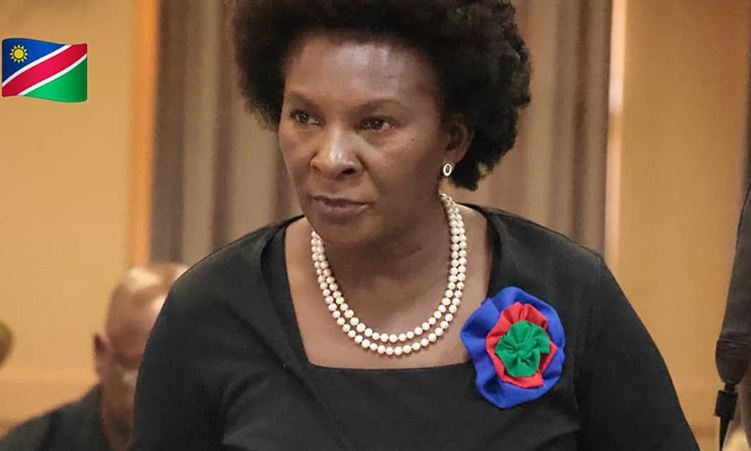BETTER service delivery, organisation and planning topped President Hifikepunye Pohamba’s agenda when he addressed Government permanent secretaries and their deputies yesterday.
Outlining what he expects of them if the country is to achieve its national development goals, Pohamba said he was not satisfied with the lack of work ethics among public servants and the services they offer to those who pay them. “Public service delivery should neither be a privilege, nor should it be provided through corrupt means in this country: our people have a right to it,” said Pohamba.Permanent secretaries should be in their offices – planning, managing and executing programmes while taking into account Government’s limited resources – rather than travelling unnecessarily locally and abroad.To date progress in service delivery had not been enough, Pohamba said, and efforts needed to be intensified to meet the expectations of citizens.He singled out the provision of national documents as an area where more could be done to see that people are serviced better.”Good intentions, good policies and good programmes would mean nothing unless these activities make meaningful impact on the lives of citizens across the length and breadth of the country.Public-sector service delivery must seek to achieve a balance between the interests of the citizen, the professional ambitions of the staff and the interests of the taxpayers,” said Pohamba.He singled out the perpetual problem of insufficient school places at the start of each school year as a problem that had to be resolved immediately, saying the current state of education was of great concern to him.”Each year we are faced with thousands of learners moving around in complete despair, unable to find a place in school.It disturbs my mind and leads me to think that we are either planning to fail, or failing to plan,” said Pohamba.”This state of affairs must be brought to an end and must not be repeated in the coming year”.Relaying his experience at a public hospital where he sought treatment recently, Pohamba said he was appalled by the deteriorating state and misuse of health infrastructure.He said the time had come to review the process of institution building, capacity building, inefficiency and effectiveness of those institutions that deliver public service.”Improving service delivery calls for a shift away from inward-looking bureaucratic systems and procedures and a search for new ways of working which put the needs of our people first.We need to completely change and find alternative ways of delivering existing services better – even if it means finding new organisational structures,” said Pohamba.He impressed on the accounting officers that they needed to be aware at all times of Government’s limited resources and competing needs.Pohamba said it was imperative that given this situation, duplication and wastage of resources were left in the past.”It is important that you spend sufficient time in the office to plan, manage and execute programmes and prioritise and significantly cut down on unnecessary and local and foreign travel,” said Pohamba.Permanent secretaries were also rapped over the knuckles for what the President termed a “chronic lack of punctuality” and being away from the office without their whereabouts being known.He said it was known that permanent secretaries were often late for meetings, failed to keep appointments, return phone calls or answer correspondence.”Inculcating discipline requires inculcating positive attitudes towards your work and making a cultural change.You must lead by example,” said Pohamba.”Not all civil servants have the right kind of work ethics.Instead of doing their job, they either just sit in their offices reading newspapers, or are found in town during working hours, conducting private business or simply loafing or going from office to office disturbing others.”Pohamba said he was concerned that civil servants who lacked work ethics were more concerned about what they can get out of their jobs rather than what they could put in.”Employment in the public service is a privilege, not an entitlement,” warned Pohamba, saying it was the duty of permanent secretaries to put an end to such attitudes.”It is your responsibility to ensure that we get value for money, to ensure that people put in [an] honest day’s work for [an] honest day’s wages”.Noting that output in terms of policy formulation had been substantial, Pohamba said he did however feel the implementation had fallen short of collective expectations because of lack of follow-up action, duplication of duties and lack of co-ordination.He said Cabinet was expecting to receive regular feedback regarding the implementation of its directives.Pohamba directed that in 2006, Permanent Secretaries pay special attention to programmes that affect social, infrastructure and economic development particularly health, education and support to vulnerable groups and those infected by HIV-AIDS.”Public service delivery should neither be a privilege, nor should it be provided through corrupt means in this country: our people have a right to it,” said Pohamba.Permanent secretaries should be in their offices – planning, managing and executing programmes while taking into account Government’s limited resources – rather than travelling unnecessarily locally and abroad.To date progress in service delivery had not been enough, Pohamba said, and efforts needed to be intensified to meet the expectations of citizens.He singled out the provision of national documents as an area where more could be done to see that people are serviced better.”Good intentions, good policies and good programmes would mean nothing unless these activities make meaningful impact on the lives of citizens across the length and breadth of the country.Public-sector service delivery must seek to achieve a balance between the interests of the citizen, the professional ambitions of the staff and the interests of the taxpayers,” said Pohamba.He singled out the perpetual problem of insufficient school places at the start of each school year as a problem that had to be resolved immediately, saying the current state of education was of great concern to him.”Each year we are faced with thousands of learners moving around in complete despair, unable to find a place in school.It disturbs my mind and leads me to think that we are either planning to fail, or failing to plan,” said Pohamba.”This state of affairs must be brought to an end and must not be repeated in the coming year”.Relaying his experience at a public hospital where he sought treatment recently, Pohamba said he was appalled by the deteriorating state and misuse of health infrastructure.He said the time had come to review the process of institution building, capacity building, inefficiency and effectiveness of those institutions that deliver public service.”Improving service delivery calls for a shift away from inward-looking bureaucratic systems and procedures and a search for new ways of working which put the needs of our people first.We need to completely change and find alternative ways of delivering existing services better – even if it means finding new organisational structures,” said Pohamba.He impressed on the accounting officers that they needed to be aware at all times of Government’s limited resources and competing needs.Pohamba said it was imperative that given this situation, duplication and wastage of resources were left in the past.”It is important that you spend sufficient time in the office to plan, manage and execute programmes and prioritise and significantly cut down on unnecessary and local and foreign travel,” said Pohamba.Permanent secretaries were also rapped over the knuckles for what the President termed a “chronic lack of punctuality” and being away from the office without their whereabouts being known.He said it was known that permanent secretaries were often late for meetings, failed to keep appointments, return phone calls or answer correspondence.”Inculcating discipline requires inculcating positive attitudes towards your work and making a cultural change.You must lead by example,” said Pohamba.”Not all civil servants have the right kind of work ethics.Instead of doing their job, they either just sit in their offices reading newspapers, or are found in town during working hours, conducting private business or simply loafing or going from office to office disturbing others.”Pohamba said he was concerned that civil servants who lacked work ethics were more concerned about what they can get out of their jobs rather than what they could put in.”Employment in the public service is a privilege, not an entitlement,” warned Pohamba, saying it was the duty of permanent secretaries to put an end to such attitudes.”It is your responsibility to ensure that we get value for money, to ensure that people put in [an] honest day’s work for [an] honest day’s wages”.Noting that output in terms of policy formulation had been substantial, Pohamba said he did however feel the implementation had fallen short of collective expectations because of lack of follow-up action, duplication of duties and lack of co-ordination.He said Cabinet was expecting to receive regular feedback regarding the implementation of its directives.Pohamba directed that in 2006, Permanent Secretaries pay special attention to programmes that affect social, infrastructure and economic development particularly health, education and support to vulnerable groups and those infected by HIV-AIDS.
Stay informed with The Namibian – your source for credible journalism. Get in-depth reporting and opinions for
only N$85 a month. Invest in journalism, invest in democracy –
Subscribe Now!










